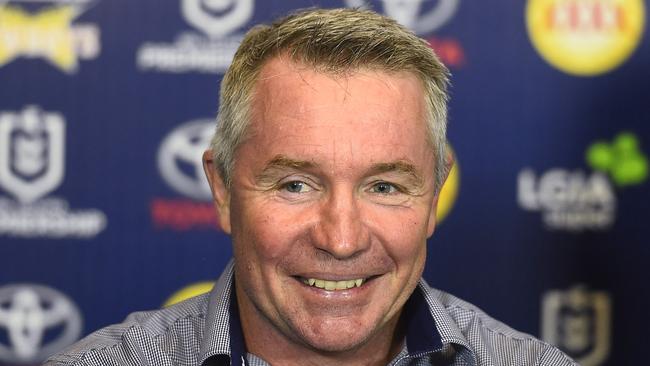Family donates footballer Paul Green’s brain to aid head trauma study
Paul Green’s family have donated his brain to the Australian Sports Brain Bank.

Paul Green’s family have donated his brain to explore further the issues suffered by rugby league players caused by head trauma.
The Green family has agreed to have the late footballer’s brain examined by the Australian Sports Brain Bank to aid scientific research that looks into the concussion-related condition of chronic traumatic encephalopathy, or CTE.
In a statement, Amanda Green said she was proud that part of her husband’s “legacy” would now be “looking out for the brain health” of all former and current players involved in rugby league.
“In memory of our beloved Paul, we ask that you support the pioneering work of the Australian Sports Brain Bank,” she said.
“Paul was known for always looking out for others.
“We are proud that part of his legacy will be looking out for the brain health of all others involved in the game that he loved.
“Amanda, Emerson and Jed”.
Last week, Green was found dead in his Brisbane home after taking his own life.
NeuroSports Labs concussion researcher Alan Pearce, who has been investigating this area for decades, said the Green family’s move to donate his brain was incredibly important.
“I think it’s really important because every brain can help piece this puzzle together further,” Dr Pearce said.
“We can’t actually answer these questions without the generous gestures from families like the Greens.”
In 2019, Canterbury Bulldogs player and coach Steve Folkes was the first Australian rugby league player to be publicly diagnosed with CTE, a degenerative brain disease caused by repeated head traumas.
Folkes’s primary cause of death was a heart irregularity.
In the AFL, the families of St Kilda great Danny Frawley and Hawthorn player Shane Tuck also donated their brains.
Both were found to have CTE, and both players had taken their own lives.
CTE can be diagnosed only by post-mortem examination.
Other deceased former rugby league players have been diagnosed with CTE but have not had their names released publicly.
Earlier in August, a report on research led by the Australian Sports Brain Bank’s Michael Buckland was released, announcing that a team of researchers had found “conclusive evidence” that CTE could be caused by repetitive head impacts such as tackling and heading the ball.
Previous studies have observed an association between contact sports and CTE but stopped short of saying that one caused the other.
Researchers from nine academic institutions in six countries, including the University of Melbourne and the University of Sydney, collated independent CTE studies from around the world, and across several different sports.
They used a method called the Bradford Hill Criteria, which has previously been used to establish the causal relationship between smoking and lung cancer.
In the case of CTE, the researchers were able to satisfy each of the nine criteria that established repetitive head impacts caused the brain disease.
In February this year, the Australian Sports Brain Bank published a paper in the Medical Journal of Australia detailing what it had found in 21 completed donations since its establishment in 2018.
“All 21 donors had participated in sports with risks of repetitive head injury, including 17 who had played in the football codes,” the authors wrote.
“All but one donor (were found to have) exhibited some form of neuro-degeneration.”




To join the conversation, please log in. Don't have an account? Register
Join the conversation, you are commenting as Logout